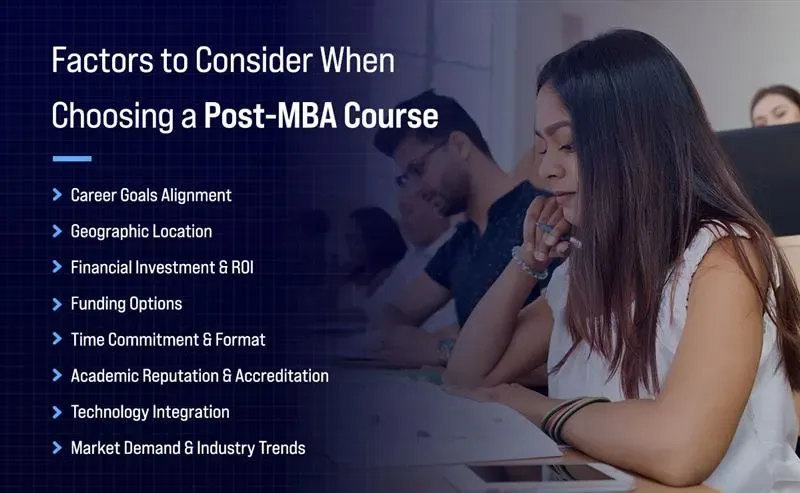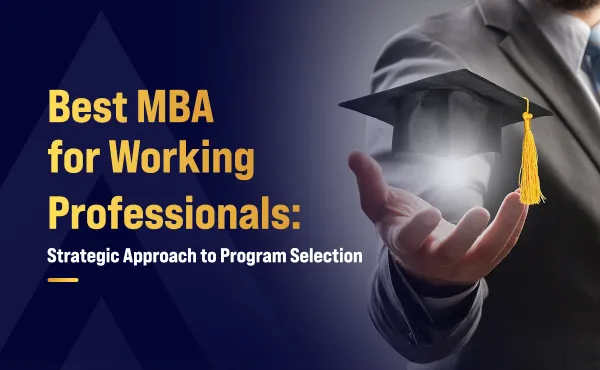After MBA Which Course is Best?

The pursuit of an MBA signifies the commencement, not the conclusion, of one's professional development. 77% of MBA graduates report an increased earning power and enjoy a 78% employability rate in India, up from 47% 4 years ago, making it the most successful among professional courses. Hence, the question isn't whether an MBA is valuable, but what comes next after this professional degree?
This article breaks down why post-MBA learning matters, lists the most valuable courses you can pursue, and gives a practical framework to choose the right one for your goals. Whether you are looking for immediate job-ready skills or a credential that opens new doors, this guide will help you decide.
Quick Decision Framework
Here is a quick view of the career directions and best courses available for students to consider after an MBA.
Career Direction | Best Course | Program Fee | Program Duration |
Business Leadership | ISB Business Analytics | ₹11 Lakhs | 15 months |
Finance Mastery | CFA Level 1-3 | ₹4 Lakhs | 18-30 months |
Senior Management | MBA-PGPX (IIM Ahmedabad) | ₹34.15 Lakhs | 12 months |
Digital Transformation | Professional Certificate in Digital Marketing – Kellogg School of Management | ₹6.17 Lakhs | 6 Months |
Academic Excellence | Doctoral Program in Management at IIM Ahmedabad | No program fee. | 4 Years |
Why Consider Studying After Completing an MBA?

The business environment of 2025 demands specialization beyond general management principles. India aims to be a $5 trillion economy by 2030, creating unprecedented demand for skilled professionals. Several forces make post-MBA courses important:
- Technology Integration: Jobs in finance, tech, marketing, and healthcare are growing at an unprecedented rate yearly, requiring specialized technical skills that traditional MBAs do not cover comprehensively.
- Market Competition: With approximately 2.3 lakh MBA graduates entering the job market annually, differentiation through specialized certifications has become crucial for career advancement.
- Industry Evolution: Tech recruiters actively seek MBA graduates for leadership roles, but with specific skill requirements in AI, data analytics, and digital transformation.
- Salary Premium: Specialized certifications can increase earning potential over standard MBA packages. A focused credential also signals a specific capability that complements your general management training.
When you pick a course after your MBA, aim for three things. It should align to the role you want; it should give applied outputs you can show, and it should fit your time and budget constraints.
Detailed Overview of Courses to Pursue After an MBA
Let us jump into a detailed overview of the courses mentioned in the table. When choosing any of the courses mentioned below, make sure that it aligns with the bigger picture you have in your mind regarding your future career goals.
1) ISB’s Advanced Management Program in Business Analytics (AMPBA)
The ISB Advanced Management Program in Business Analytics (AMPBA) is a specialized executive program designed to equip professionals with advanced skills in analytics, artificial intelligence, and machine learning for business decision-making. It features a rigorous blend of theoretical and experiential learning, making it one of India's most comprehensive analytics programs for mid-career executives and aspiring business leaders.
What the Program Covers:
- Integral curricular components encompass statistics, coding in Python, R, and SQL, alongside data visualization techniques.
- Core courses covering advanced statistics, machine learning, deep learning, Generative AI, large language models, and optimization.
- Application modules targeting analytics in marketing, finance, retail, supply chain, and more.
- Experiential projects, including a Foundation Project and an industry-sponsored Capstone Project for real-world application.
Who Benefits Most:
The program is tailored for:
- Professionals with a minimum of 2 years work experience.
- Individuals from diverse industries (IT, finance, healthcare, manufacturing, consulting, etc.).
- Candidates seeking roles such as business analyst, data scientist, or leaders managing analytics teams.
Time Commitment and Structure:
- Duration: 12 months plus 3 months for the Capstone Project.
- Format: Live online and on-campus residencies (five residencies of five days each).
- Weekly Estimate: 10–12 hours for assignments, projects, and peer learning.
Additional Information:
- Fees and charges: Tuition fee INR 9,91,500 plus GST, admission fee INR 1,08,500 plus GST, refundable deposit INR 5,000, and application fee INR 2,000.
- Scholarships, employer sponsorship, and education loans are available. Career guidance, industry connect series, and alumni mentorship are included.
The AMPBA is perfectly suited for professionals who aspire to spearhead data-centric initiatives in various industries.
2) Chartered Financial Analyst (CFA)
The CFA Program, conducted by the CFA Institute, is a globally recognized certification designed for investment professionals seeking advanced skills in portfolio management and financial analysis. It consists of three rigorous exam levels, each building on the last and integrating ethics, quantitative methods, portfolio construction, and investment valuation.
What the Program Covers:
Across Levels I-III, the CFA curriculum includes:
- Ethics & Professional Standards
- Quantitative Methods and Economics
- Financial Statement Analysis and Corporate Finance
- Equity, Fixed Income, Derivatives, and Alternative Investments
- Portfolio Construction, Risk Management, and Asset Allocation
- Provided specialized pathways at Level III, including Portfolio Management, Private Wealth, and Private Markets.
- Practical Skills Modules (PSMs) such as financial modeling, Python for data science, and analyst skills are mandatory for each level.
Who Benefits Most:
The program is best suited for:
- Professionals and students in finance, economics, business, or related fields.
- Aspiring portfolio managers, wealth advisors, equity analysts, risk managers, and investment bankers.
- Early-career professionals and university students (eligible from third year onwards).
Time Commitment and Structure:
- 300+ study hours are recommended per level, with most candidates completing the program in around four years.
- Three exam levels; each exam lasts 4.5 hours, and candidates must complete one PSM at each level.
- Maximum of six attempts per exam; exams held multiple times annually worldwide.
- The total program fee is INR 4,00,958 ($1,140 to $1,590 per level).
Additional Information:
- Scholarships are available to eligible candidates.
- The CFA charter signifies advanced investment expertise, ethical commitment, and global career mobility.
- Registration requires scheduling via a global network of test centers and following strict ethical standards.
The CFA Program delivers a longstanding career advantage for those aiming to excel in today’s complex financial landscape.
3) IIM Ahmedabad’s MBA-PGPX
The IIM Ahmedabad MBA-PGPX is a prestigious one-year full-time residential MBA for experienced professionals seeking transformative leadership growth and global business exposure. Recognized for academic rigor and stellar career progression, PGPX blends foundational management knowledge with advanced electives and experiential learning.
What the Program Covers:
- Core courses in management fundamentals, strategy, marketing, finance, operations, and leadership.
- Electives across diverse domains, enabling specialization and mastery in chosen areas.
- International Immersion Program, which includes two weeks at leading global schools for foreign business exposure.
- Capstone simulation integrates learnings for real-world decision-making.
- Pedagogy emphasizing case methods, group projects, simulations, outdoor field trips, and peer learning.
Who Benefits Most:
The program is best suited for:
- Managers and professionals with at least 4 years of post-graduate work experience and aged 25+.
- Mid-career achievers targeting senior management, C-suite, entrepreneurial, or cross-functional global roles.
- Candidates from varied industries (IT, manufacturing, consulting, banking, defense, etc.) and backgrounds.
Time Commitment and Structure:
- Intensive 1-year duration, full-time residential format.
- Includes classroom sessions, self-study, assignments, group projects, and immersive campus life.
- Average peer experience of this program is 7-8 years, with high diversity, and a collaborative culture.
Additional Information:
- The program fee is INR 34.15 lakhs plus the International Immersion cost.
- Scholarships and merit-based financial aid are available.
- Rigorous selection process, requiring GMAT/GRE scores and interviews.
PGPX is ideal for ambitious professionals looking to accelerate career growth in a high-performance, global context.
4) Professional Certificate in Digital Marketing by Kellogg School of Management
The Professional Certificate in Digital Marketing offered by Kellogg Executive Education is a comprehensive six-month online program designed to equip professionals with modern digital marketing skills and strategies. It combines academic rigor from a top-ranked marketing school with practical, real-world applications, making it ideal for marketers aiming to excel in a data-driven and automated marketing landscape.
What the Program Covers:
The comprehensive curriculum covers:
- Core digital marketing topics including content marketing, SEO, SEM, social media marketing, email marketing, and marketing automation.
- Advanced skills in customer experience, marketing experimentation, analytics, conversion optimization, and product/account management.
- Emphasis on data-driven marketing, including campaign optimization using A/B testing, attribution, and growth marketing tactics.
- Hands-on learning through simulations, case studies, and a capstone project that applies theory to real-world marketing scenarios.
- Dedicated career guidance including webinars, resume and LinkedIn profile building, interview preparation, and salary negotiation.
Who Benefits Most:
The program is best suited for:
- Senior professionals, entrepreneurs, and founders seeking end-to-end digital marketing excellence.
- Early- to mid-career marketing professionals aiming to enhance skills in digital tools and strategic implementation.
- Professionals in allied fields such as PR, sales, analytics, and product development wanting to transition into marketing.
Time Commitment and Structure:
- Duration: 6 months, entirely online.
- Weekly Effort: 10-15 hours combining prerecorded videos, live mentorship sessions, group discussions, and self-study.
- Program fee: $7,025 (INR 6.17 Lakhs approx.).
Additional Information:
- The Kellogg brand and faculty leadership bring world-class expertise and insights.
- Participants gain career coaching and networking opportunities through live virtual mixers.
- Completion earns a verified digital certificate from Kellogg Executive Education.
- Financing options and referrals available to support affordability.
This program is ideal for professionals seeking to master the evolving digital marketing ecosystem with strategic depth and practical know-how.
5) IIM Ahmedabad’s Doctoral Program in Management
IIMA’s Ph.D. in Management is a full-time, research-focused program that combines rigorous coursework, area-specific training, and a dissertation. It offers eleven specializations and emphasizes methodological depth, interdisciplinary work, and close faculty mentorship. Course work totals 30.5 credits and spans induction plus six terms.
What the Program Covers:
This comprehensive curriculum covers:
- Core doctoral courses in mathematics, research methods, statistics, and research communication.
- It also includes various area courses, including deep theory and applied seminars in fields such as Finance, Marketing, Economics, Operations, Information Systems and Public Systems.
- It leverages research training, which is a mandatory summer research project including a comprehensive examination, thesis proposal, dissertation, and thesis defense.
Who Benefits Most:
The program is best suited for:
- Candidates who are aiming for academic careers, research institutions, or high-level consultancy and policy roles.
- Applicants with strong quantitative or disciplinary backgrounds and clear research interests.
Time Commitment and Structure:
- Duration: The program typically lasts a little over four years, which includes two years of coursework and thesis work.
- Mode: It is a Full-time residential program with heavy term workloads, seminars, and research responsibilities.
Additional Information:
- There is no tuition charged to admitted doctoral students, as IIMA provides comprehensive financial assistance that covers academic expenses.
- There is a monthly subsistence allowance for students of Rs. 42,000 (years 1–2), Rs. 45,000 (post comprehensive exam), and Rs. 50,000 (after thesis proposal).
- Additional support includes a contingency allowance of Rs. 35,000 per year (up to five years), conference reimbursement of up to Rs. 4,00,000, fieldwork support of up to Rs. 2,00,000, a startup grant of Rs. 100,000, and house rent allowance options.
- The application fee for the program is Rs. 500 (general).
IIM Ahmedabad’s Doctoral Program in Management empowers scholars to become thought leaders who shape business knowledge and practice globally.
Note: These are just a few academic pathways after an MBA. Many other institutions offer specialized certificates, doctoral programs, and executive MBAs tailored for diverse career ambitions. Prospective students are highly advised to perform extensive due diligence before confirming their advanced educational choices.
Factors to Consider When Choosing a Post-MBA Course
Selecting an appropriate specialization following an MBA is a pivotal determinant of one's future career path and income capacity. With 97% of the employers valuing specialized micro-credentials, the selection process requires careful consideration of multiple factors specific to India's dynamic business landscape.

1) Career Goals Alignment
Your post-MBA course must directly serve your long-term professional vision. In India's competitive landscape, specific sectors like consulting and finance offer great packages, while fields like data analytics and digital marketing are in high demand. Carefully match your specialization, be it finance, marketing, or business analytics, with evolving market needs to ensure your skills remain relevant and valuable, maximizing your career growth and earning potential.
2) Geographic Location
The city you work in significantly impacts your compensation. Metropolitan hubs like Mumbai and Bengaluru offer salaries 30-50% higher than tier-2 cities, but this comes with an elevated cost of living. Weigh the higher earning potential against increased expenses and lifestyle preferences. Tier-2 cities may offer a better work-life balance and lower costs, making the net savings comparable despite a lower gross salary.
3) Financial Investment & ROI
Critically evaluate the total program cost against the expected salary increase. High-ROI options like digital marketing certifications can pay for themselves within a year, while prestigious executive MBAs involve a larger initial investment but lead to immediate high-level roles. Always calculate the opportunity cost of a full-time program, including lost income, versus part-time alternatives that allow you to continue earning.
4) Funding Options
It is prudent to investigate every available funding option to mitigate personal expenditure. Major banks offer education loans at competitive rates for premier institutions. Investigate employer sponsorship programs, which are a cost-effective way to upskill. Furthermore, many top programs provide substantial need-cum-merit scholarships, especially for women, defense personnel, and exceptional candidates, which can significantly lower the financial burden.
5) Time Commitment & Format
Honestly assess your capacity for studies alongside professional and personal commitments. Intensive one-year residential programs require a complete career break, while part-time executive, weekend, or online formats offer flexibility for working professionals. Your choice should align with your current lifestyle, ensuring you can manage the workload without compromising on performance in the course or at your job.
6) Academic Reputation & Accreditation
The brand value of your institution profoundly impacts starting salaries and career opportunities. Graduates from top-tier institutes command significantly higher packages. For global aspirations, prioritize programs with international accreditations like AACSB or EQUIS, which guarantee a globally recognized standard of education. Also, consider the expertise of the faculty in your chosen specialization.
7) Technology Integration
In today's digital economy, choose a program that robustly integrates technology. With employers highly valuing AI and analytics micro-credentials, a future-ready curriculum is essential. Ensure the course covers emerging areas like data analytics, AI applications, fintech, and digital marketing. This integration is vital for maintaining relevance and competitiveness in India's rapidly transforming business environment.
8) Market Demand & Industry Trends
Align your specialization with high-growth sectors to ensure long-term demand for your skills. Currently, fields like business analytics, healthcare management, fintech, and supply chain are experiencing rapid growth in India. Selecting a course that caters to these expanding industries maximizes your job security and career progression potential, safeguarding your investment against market shifts.
Summing Up
The path to post-MBA success is shaped by your commitment to continuous learning. With 92 million jobs expected to be displaced by 2030 due to labor market transformation, the most successful MBA graduates are those who proactively bridge emerging skill gaps through specialized education.
India's trajectory toward a $7.3 trillion economy by 2030 presents unprecedented opportunity for MBA graduates who strategically upskill. Whatever course you choose, your post-MBA education investment should act as the differentiator that transforms good careers into extraordinary one's for you.
Remember, your MBA opened doors, but specialized expertise keeps them open and creates new ones. As the job market rewards micro-credentials and sector-specific knowledge, the question is not whether to pursue additional education after an MBA, but which pathway aligns best with your vision of professional success in India's dynamic future economy.





